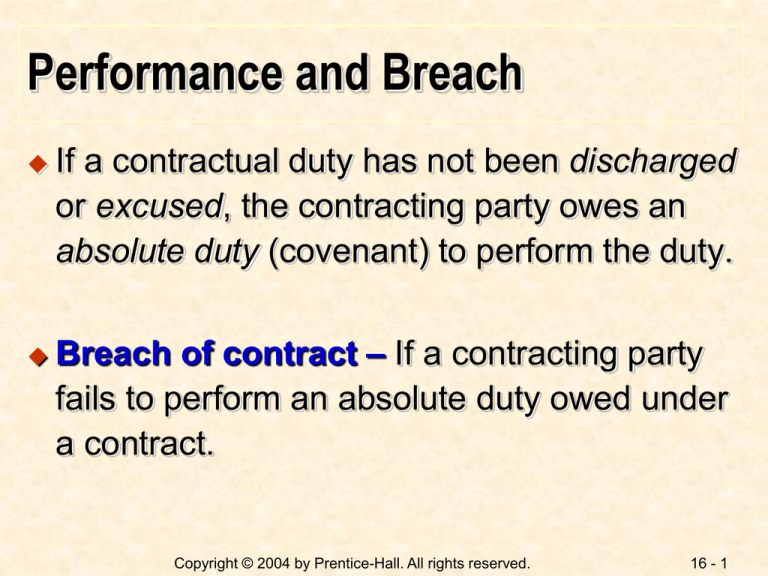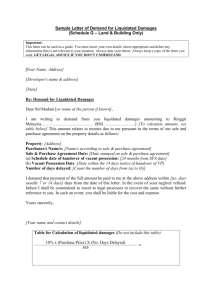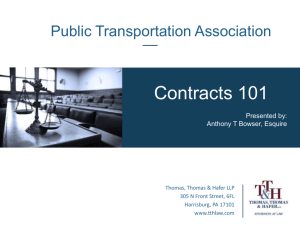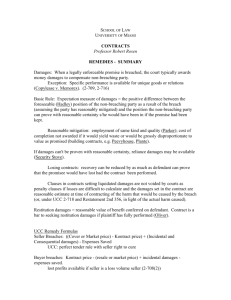
Performance and Breach
If a contractual duty has not been discharged
or excused, the contracting party owes an
absolute duty (covenant) to perform the duty.
Breach of contract – If a contracting party
fails to perform an absolute duty owed under
a contract.
Copyright © 2004 by Prentice-Hall. All rights reserved.
16 - 1
Summary: Types of Performance
Type of Performance
Legal Consequence
Complete Performance
The contract is discharged.
Substantial Performance The non-breaching party may recover damages caused by
(minor breach)
the breach.
Inferior Performance
(material breach)
The non-breaching party may either:
(1) Rescind the contract and recover restitution, or
(2) Affirm the contract and recover damages.
Copyright © 2004 by Prentice-Hall. All rights reserved.
16 - 2
Anticipatory Breach
A breach that occurs when one contracting
party informs the other that he or she will not
perform his or her contractual duties when
due.
Copyright © 2004 by Prentice-Hall. All rights reserved.
16 - 3
Monetary Damages
A non-breaching party may recover
monetary damages from a breaching party.
Monetary damages are available whether the
breach was minor or material.
Copyright © 2004 by Prentice-Hall. All rights reserved.
16 - 4
Types of Monetary Damages
Compensatory
Damages
Nominal
Damages
Copyright © 2004 by Prentice-Hall. All rights reserved.
Consequential
Damages
Liquidated
Damages
16 - 5
Compensatory Damages
Award of money intended to compensate a
non-breaching party for the loss of the
bargain.
They place the non-breaching party in the
same position as if the contract had been
fully performed by restoring the “benefit of
the bargain.”
Copyright © 2004 by Prentice-Hall. All rights reserved.
16 - 6
Compensatory Damages (continued)
The amount of that will be awarded for
breach of contract depends on:
The type of contract involved, and
Which party breached the contract.
Special types of contracts:
Sale of Goods
Construction Contracts
Employment contracts
Copyright © 2004 by Prentice-Hall. All rights reserved.
16 - 7
Consequential Damages
Foreseeable damages that arise from
circumstances outside the contract.
To be liable for these damages,
The breaching party must know or have
reason to know that the breach will cause
special damages to the other party.
Copyright © 2004 by Prentice-Hall. All rights reserved.
16 - 8
Liquidated Damages
Damages to which parties to a contract
agree in advance if the contract is breached.
To be lawful,
The actual damages must be difficult or
impracticable to determine, and
The liquidated amount must be reasonable in
the circumstances.
Copyright © 2004 by Prentice-Hall. All rights reserved.
16 - 9
Liquidated Damages (continued)
Many businesses include liquidated
damages in their commercial contracts,
which help to:
Provide certainty,
Avoid lawsuits, and
Provide an incentive to enter into contracts.
Copyright © 2004 by Prentice-Hall. All rights reserved.
16 - 10
Nominal Damages
Damages awarded when the non-breaching
party sues the breaching party even though
no financial loss has resulted from the
breach.
Usually awarded in a small amount such as
$1.
Cases involving nominal damages are
usually brought on “principle.”
Copyright © 2004 by Prentice-Hall. All rights reserved.
16 - 11
Mitigation of Damages
A non-breaching party is under a legal duty
to avoid or reduce damages caused by a
breach of contract.
The extent of mitigation depends on the type
contract involved.
Copyright © 2004 by Prentice-Hall. All rights reserved.
16 - 12
Punitive Damages
Damages that are awarded to:
Punish the defendant
Deter the defendant from similar conduct in
the future
Set an example for others
Generally, punitive damages are not
recoverable for breach of contract.
Copyright © 2004 by Prentice-Hall. All rights reserved.
16 - 13









